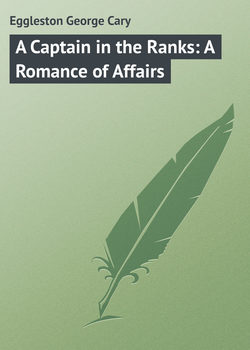Читать книгу A Captain in the Ranks: A Romance of Affairs - Eggleston George Cary, Marbourg Dolores - Страница 8
VII
The "Sizing Up" of Guilford Duncan
ОглавлениеCaptain Will Hallam was quick to make up his mind with regard to a man. He was exceedingly accurate in his human judgments, too, and his confidence in them had been strengthened by experience in successfully acting upon them. As he phrased it, he "knew how to size a man up," and, as the employer of multitudes of men in all parts of the country and in all sorts of capacities, he had daily need of the skill he had acquired in that art. It was as much a part of his equipment for the conduct of his vast and varied enterprises as was his money capital itself.
When young Duncan presented himself in the private office after his night's vigil as a watchman, Captain Hallam asked him to sit. That was a recognition of his social status as something better than his employment of the night before might have suggested. Ordinarily a man employed as a levee watchman would not have been told to come to the private office at all. Nor would such a man have seen anybody higher than a junior clerk in collecting his wages.
But Captain Hallam had been impressed by this newcomer, and he wanted to talk with him.
He broke at once into a catechism.
"Why did you do that little fire-extinguishing act last night?"
He asked the question precisely as he might have done if he had resented the saving of his wealth of cotton.
"Oh, it was simple enough. The fire meant damage, and I was there. So, of course, I put it out."
"But why? The cotton wasn't yours, and you hadn't been hired to watch it."
"No, of course not. But when a gentle – I mean when any decent man sees property afire he doesn't ask whose it is before putting out the blaze."
"You're a Virginian, I should say, from your voice – late of the rebel army. What's your rank?"
"None now. I've put the war completely behind me. I'm beginning life anew."
"Good! I wish everybody, north and south, would do the same. But fools won't, and men are mostly fools, you know. When did you get to Cairo?"
"About five minutes before you saw me putting out the fire. I came down the river on the big tow boat."
"Where's your baggage?"
"On my back. I have no other clothes. I'll buy some when I earn some money."
"Where have you been since the surrender?"
"Making my way West."
"How?"
"On foot to Wheeling. Then on the tow boat."
"What fare did they make you pay?"
"None. I worked my way as a stoker – fireman they call it out here."
"No wages? Just passage and grub?"
"That was all."
"What have you got on your wheel house?"
"I fear I don't understand."
"Oh, that's river slang. You know every side-wheel steamer has a statement of her destination painted on her wheel house. I meant to ask what are your plans?"
"To find work and do it."
"What kind of work?"
"Any kind that's honest."
"You are educated, I suppose?"
"Yes, in a way. I'm an A. M. and a graduate in law."
"Know anything about business?"
"No, but I shall learn."
"If you can, you mean?"
"Oh, I can. A capable man can learn anything if he really wants to."
"I don't know about that. But I'll gamble on the proposition that you can."
"Thank you."
"No thanks are needed. I wasn't complimenting. I was just expressing an opinion."
Scribbling a memorandum on a scrap of paper, Captain Hallam handed it to Duncan, saying:
"Give that to the cashier as you go out, and get your wages. Then you'd better get your breakfast. I recommend you, while you're poor, to eat at the little booths along the levee, where they sell very good sandwiches and coffee cheap. After breakfast, if you choose to come back here I'll try to find something for you to do. Oh, I forgot. You were up all night, so you'll want to sleep."
There was an interrogative note in the last sentence. Captain Hallam was "sizing up" his man, and he closely scrutinized Duncan's face as the answer came.
"Oh, I'm used to night duty. I'm ready for a day's work if you can give me one. As for breakfast, I've had it."
"Then you had money?"
"A very little; but I didn't spend any of it. I sawed and split a load of wood for the keeper of a booth, and he gave me some bread and ham and coffee for my work."
"Oh, that's the way you managed it. Very well. Come back here in two hours anyhow."
After the young man had passed out, Captain Hallam said to one of his partner brothers:
"That fellow is a good sort. He has sand in his gizzard. When he comes back set him at work at something or other – several things in succession in fact – and find out what he can do."
Such was Guilford Duncan's mustering into the new service of work.
